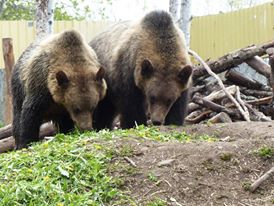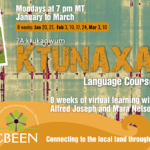Landmark grizzly cub release staged from Castlegar
Two male grizzly bear cubs named Blair and Terry, who were orphaned in the Kootenays in the fall of 2012, are on the road back to freedom. The cubs were orphaned in October when they were eight months old, after their mother came into conflict with humans and was killed. They were rescued and raised in captivity and are now ready to be released close to their home range.
The bears have spent the last seven months at the Northern Lights Wildlife Society (NLWS – www.wildlifeshelter.com) rehabilitation centre where they were raised in large enclosures with very limited human contact until they were old enough, strong enough and had the skills to be released back to the wild. They will travel by road from Smithers to an area outside of Castlegar inside individual culvert traps on a flatbed truck. Each will be fitted with a satellite collar and released on today (June 19) into a remote area away from human activity, where they’ll be monitored for 18 months.
The rescue, transport and release of the grizzlies is part of a unique cooperative pilot project between the International Fund for Animal Welfare (IFAW – www.ifaw.org), the Northern Lights Wildlife Society (NLWS – www.wildlifeshetler.com) and the B.C. Ministries of Environment, and Forests, Lands and Natural Resource Operations.
The project will study whether releasing orphaned grizzlies is viable. This is the fourth time such a release has taken place. Two bears were released in July of 2008, two in the summer of 2009 and four in the summer of 2011.
“So far, eight grizzly cubs have been re-introduced to the wild as part of this pilot project,” said Angelika Langen of NLWS. “It’s our hope that this work will help to save even more grizzlies.”
“Tracking the movements of the grizzlies using satellite collars is providing vital information on the movements of the bears,” said John Beecham, bear specialist with IFAW. “It’s a key part of the project that helps us to scientifically validate whether what we’re doing is working.”
Human-bear conflict is an ongoing concern in areas like the Kootenays, and the reason why these two bears were orphaned in the first place. For tips on how to reduce human-bear conflict, please visit wildsafebc.com.
Rehabilitating orphan bear cubs is viewed by IFAW as a more sustainable and humane alternative than killing the bears outright. Similar bear rehabilitation projects are being supported by IFAW in Russia and India.
About IFAW (the International Fund for Animal Welfare)
Founded in 1969, IFAW saves animals in crisis around the world. With projects in more than 40 countries, IFAW rescues individual animals, works to prevent cruelty to animals, and advocates for the protection of wildlife and habitats. For more information visit our website and follow us on YouTube, Twitter and Facebook.

























